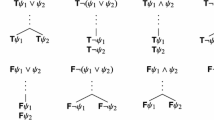Abstract
Dialogue moves influence and are influenced by the agents’ preferences. We propose a method for modelling this interaction. We motivate and describe a recursive method for calculating the preferences that are expressed, sometimes indirectly, through the speech acts performed. These yield partial CP-nets, which provide a compact and efficient method for computing how preferences influence each other. Our study of 100 dialogues in the Verbmobil corpus can be seen as a partial vindication of using CP-nets to represent preferences.
Access this chapter
Tax calculation will be finalised at checkout
Purchases are for personal use only
Preview
Unable to display preview. Download preview PDF.
Similar content being viewed by others
References
Asher, N., Lascarides, A.: Logics of Conversation. Cambridge University Press, Cambridge (2003)
Asher, N.: Reference to Abstract Objects in Discourse. Kluwer Academic Publishers, Dordrecht (1993)
Baldridge, J., Lascarides, A.: Probabilistic head-driven parsing for discourse structure. In: CoNLL’05 (2005)
Boutilier, C., Brafman, R., Domshlak, C., Hoos, H., Poole, D.: CP-nets: A Tool for Representing and Reasoning with Conditional Ceteris Paribus Preference Statements. Journal of Artificial Intelligence Research 21, 135–191 (2004)
Boutilier, C., Brafman, R., Domshlak, C., Hoos, H., Poole, D.: Preference-Based Constrained Optimization with CP-nets. Computational Intelligence 20(2), 137–157 (2004)
Grice, H.P.: Logic and conversation. In: Sytnax and Semantics. Speech Acts, vol. 3, pp. 41–58 (1975)
Hamblin, C.: Imperatives. Blackwells, Oxford (1987)
Hobbs, J.R., Stickel, M., Appelt, D., Martin, P.: Interpretation as abduction. Artificial Intelligence 63(1-2), 69–142 (1993)
Lascarides, A., Asher, N.: Grounding and correcting commitments in dialogue. In: Proceedings to SIGDIAL, pp. 29–36 (2008)
Mann, W.C., Thompson, S.A.: Rhetorical structure theory: A framework for the analysis of texts. International Pragmatics Association Papers in Pragmatics 1, 79–105 (1987)
Rossi, F., Venable, B., Walsh, T.: mCP nets: representing and reasoning with preferences of multiple agents. In: AAAI’04, pp. 729–734 (2004)
Schlangen, D., Lascarides, A.: Resolving fragments using discourse information. In: Edilog’02 (2002)
Wahlster, W. (ed.): Verbmobil: Foundations of Speech-to-Speech Translation. Springer, Heidelberg (2000)
Author information
Authors and Affiliations
Editor information
Editors and Affiliations
Rights and permissions
Copyright information
© 2010 Springer-Verlag Berlin Heidelberg
About this paper
Cite this paper
Asher, N., Bonzon, E., Lascarides, A. (2010). Extracting and Modelling Preferences from Dialogue. In: Hüllermeier, E., Kruse, R., Hoffmann, F. (eds) Computational Intelligence for Knowledge-Based Systems Design. IPMU 2010. Lecture Notes in Computer Science(), vol 6178. Springer, Berlin, Heidelberg. https://doi.org/10.1007/978-3-642-14049-5_56
Download citation
DOI: https://doi.org/10.1007/978-3-642-14049-5_56
Publisher Name: Springer, Berlin, Heidelberg
Print ISBN: 978-3-642-14048-8
Online ISBN: 978-3-642-14049-5
eBook Packages: Computer ScienceComputer Science (R0)




